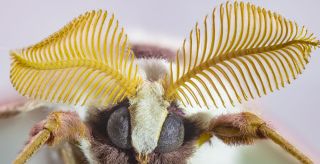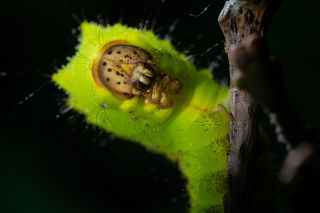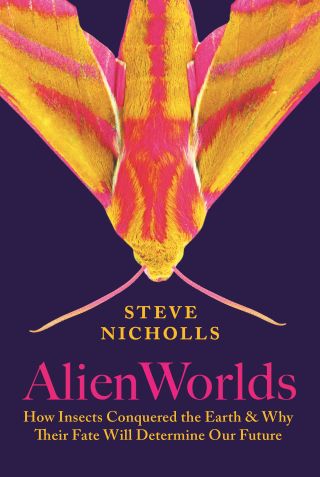Animal Behavior
Insects Are Earth's Most Important Animals, Humans Included
A fascinating new book clearly shows why this is so.
Posted July 31, 2023 Reviewed by Gary Drevitch
Key points
- Complex ideas can be made easily accessible if they are turned into well-told stories.
- The fascinating book 'Alien Worlds' shows that the fate of insects has profound implications for our future.
- Very few people recognize the vital role insects play in keeping our planet ticking along.

Insects are amazing animals. They're all over the place and simply put, their well-being is crucial for the fate of our planet and all other animals, including ourselves. One of my favorite quotes from the late Edward O. Wilson, who was a leading expert on insects, is: “If all mankind were to disappear, the world would regenerate back to the rich state of equilibrium that existed ten thousand years ago. If insects were to vanish, the environment would collapse into chaos.”
Because so many people, if not most, really don't know insects all that well and casually write them off as "pests" to be exterminated for numerous reasons, I'm thrilled that Steve Nicholls could answer a few questions about his easy-to-read, fascinating, beautifully illustrated landmark new book Alien Worlds: How Insects Conquered the Earth, and Why Their Fate Will Determine Our Future.1
Marc Bekoff: Why did you write Alien Worlds?
Steve Nicholls: I’m a flag-waving enthusiast for insect-kind, yet so many people that I meet just dismiss them as nothing but pests or a nuisance or see them as something to be frightened of, if they even notice them at all. Very few people recognize the vital role that insects play in keeping our planet ticking along. However, whenever I give talks or lead field trips, and shine a light on the intimate details of insect lives, people soon become fascinated. Back in 1968, at an International Union for the Conservation of Nature conference, a Senegalese forester, Baba Dioum, pointed out that "in the end we will conserve only what we love; we will love only what we understand; and we will understand only what we are taught." In writing Alien Worlds, I hope to bring a deeper understanding of the insect world and, who knows, maybe even a bit of love.2

MB: Who is your intended audience?
SN: Although the book delves into the latest science in many areas of entomology, it’s intended for a broad and general audience. Working as a wildlife and science filmmaker for such a long time has taught me that even complex ideas can be made easily accessible if they are turned into a well-told story.
MB: What are some of the topics you weave into your book and what are some of your major messages?
SN: In many of the TV shows that I’ve made that feature insects, I point out that insects are the most successful group of animals ever to have evolved (well…maybe mites or nematodes may run them close, but fewer people are looking at these groups). The reasons for this are many, varied, and fascinating, and reflect widely on many aspects of biology, but are too complicated to do much except gloss over them in TV shows. (That said, my recent series, Planet Insect, for Curiosity Stream, does touch on these topics.) In the end, however, the story of insect success is best told in a book.
Using this as a linking theme allowed me to explore, among other topics, insect origins and evolution, the origins of flight, the development of complex parental care, the surprisingly widespread social lives of insects, and the origins of the great insect societies. Insects were the first creatures to conquer the air, an evolutionary leap that is an undoubted part of their success story. However, the evolution of complete metamorphosis may have played an even greater part – perhaps the most successful thing evolution ever came up with. That magical transformation of earthbound larva into winged adult is all the more fascinating when we realise how, in so many ways, it helps to shape the whole planet. Explaining the ecological success of insects also shows why they underpin most terrestrial and freshwater ecosystems and therefore provides a deep background to the unfolding crisis of the rapid decline of insects that’s hit the headlines over the last few years.

MB: How does your book differ from others concerned with some of the same general topics?
SN: There are many excellent entomology books already out there and more appearing all the time. Most that deal in depth with the details of insect evolution and ecology, however, are seen more as textbooks. But I wanted to cover all these topics, which have always fascinated me, in a way which a general reader would find equally fascinating and to pull all these varied subjects into one grand story of how insects became what they are. In addition, as a wildlife filmmaker and photographer, I love capturing the wonder of insects in images, so the book is also heavily illustrated with my photographs from around the world, hopefully making it all the more accessible.
MB: Are you hopeful that as people learn more about insects they will come to respect them more for who they are and what they really mean to the health of our magnificent planet?
SN: I’m a born optimist, even though I’ve witnessed firsthand many of the problems facing the natural world. In my mind, key to harnessing public opinion and making real progress toward a viable future for humankind is to engender a far more respectful view of all the life that shares our planet, and that includes the unloved bugs. Recent work on insect consciousness is turning them from little automatons into something much easier to empathise with: fellow sentient beings. My good friend, Steve Buchmann, an entomologist from Tucson with whom I’ve worked on many occasions, has just published What a Bee Knows, which is helping this transformation to a more widespread respect for insect-kind.
I work to engage broad public empathy for the lesser-known parts of the natural world through both writing and TV documentaries. In 1996, I made a series on insects, called "Alien Empire," for PBS and the BBC, which generated a lot of interest in insects, particularly among younger viewers, although it proved a hard slog to get similar films commissioned, at least until recently.
Over the last five years, I’ve worked on several major projects for broadcasters as varied as Apple TV+, the Smithsonian Channel, and National Geographic, all of which featured insects in a major role. I also know of several other insect series that have recently been commissioned. It seems to me that once hard-bitten commissioners start recognising the value of insects, we’re well on our way to a wider public appreciation of this alien world.
References
In conversation with award-winning television documentary producer and director Steve Nicholls. He is passionate about communicating science to as wide an audience as possible, which he does through film and television as well as writing and lectures. Previous books include Paradise Found: Nature in America at the Time of Discovery and Flowers of the Field: A Secret History of Meadow, Moor and Wood.
1) The book's description reads: Life on Earth depends on the busy activities of insects, but global populations of these teeming creatures are currently under threat, with grave consequences for us all. Alien Worlds presents insects and other arthropods as you have never seen them before, explaining how they conquered the planet and why there are so many of them, and shedding light on the evolutionary marvels that enabled them to thrive. Blending glorious imagery with entertaining and informative science writing, this book takes you inside the hidden realm of insects and reveals why their fate carries profound implications for our own.
2) I trained as an entomologist but moved into nature and science documentary making some 4 decades ago. However, I found a terrible bias toward the big and charismatic beasts in these shows, so I’ve spent a lot of those forty years finding ways to showcase the little guys. In part, the book brings together all those experiences and adventures in hunting down insects to film and photograph around the world. Making these films gave me the chance to meet and work with other entomologists in many parts of the world all of whom were unfailingly generous in sharing their knowledge and enthusiasm, and showcasing their work forms another thread running through Alien Worlds.
The Fascinating Minds and Personalities of Bees; The Mind-Boggling, Fascinating Behavior of Insects; Insect Sentience: Science, Pain, Ethics, and Welfare; Flies: The Fascinating Lives of the Most Successful Insects; Wasps: The Astonishing Diversity of a Misunderstood Insect.




